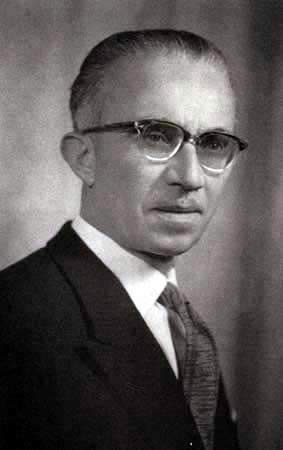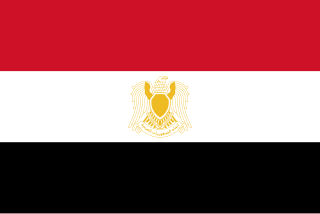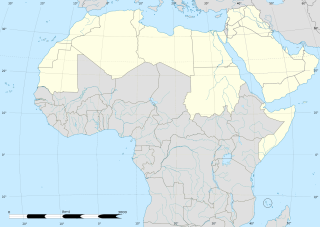
The United Arab Republic was a sovereign state in the Middle East from 1958 until 1961. It was initially a short-lived political union between Egypt and Syria from 1958 until Syria seceded from the union following the 1961 Syrian coup d'état. Egypt continued to be known officially as the United Arab Republic until it was formally dissolved by Anwar Sadat in September 1971.

The Arab Socialist Baʿth Party, also anglicized as Ba'ath in loose transcription, with baʿth meaning resurrection, was a political party founded in Syria by Mishel ʿAflaq, Ṣalāḥ al-Dīn al-Bīṭār, and associates of Zakī al-ʾArsūzī. The party espoused Baʿathism, which is an ideology mixing Arab nationalist, pan-Arab, Arab socialist, and anti-imperialist interests. Baʿthism calls for the unification of the Arab world into a single state. Its motto, "Unity, Liberty, Socialism", refers to Arab unity and freedom from non-Arab control and interference.

Abdul Salam Mohammed ʿArif al-Jumayli was the second president of Iraq from 1963 until his death in a plane crash in 1966. He played a leading role in the 14 July Revolution, in which the Hashemite monarchy was overthrown on 14 July 1958.

The national flag of Egypt is a tricolour consisting of the three equal horizontal red, white, and black bands of the Egyptian revolutionary flag that dates back to the 1952 Egyptian Revolution. The flag bears Egypt's national emblem, the Egyptian eagle of Saladin, centred in the white band.
As a result of the Syrian revolution, two flags have been used to represent Syria since 2011, used by different factions in the war. The Syrian Arab Republic led by Bashar al-Assad of the Ba'ath Party used the red-white-black tricolour originally used by the United Arab Republic, whilst Syrian opposition factions such as the Syrian National Coalition use the green-white-black tricolour known as the "Independence flag", first used by the First Syrian Republic. Opposition forces took control of the capital Damascus on 8 December 2024, prompting President Assad to resign and leave the country. Subsequently the "Independence flag" began to be flown within the country and at Syrian embassies abroad.

The United Arab States was a short-lived confederation of the United Arab Republic and the Mutawakkilite Kingdom of Yemen from 1958 to 1961.

Nazim al-Qudsi, was a Syrian politician who served as the president of Syria from 14 December 1961 to 8 March 1963.

The Federation of Arab Republics was an unsuccessful attempt by Muammar Gaddafi to merge Libya, Egypt and Syria in order to create a unified Arab state. Although approved by a referendum in each country on 1 September 1971, the three countries disagreed on the specific terms of the merger. The federation lasted from 1 January 1972 to 19 November 1977.

Salah al-Din al-Bitar was a Syrian politician who co-founded the Baʿath Party with Michel Aflaq in the early 1940s. As students in Paris in the early 1930s, the two formulated a doctrine that combined aspects of nationalism and socialism. Bitar later served as prime minister in several early Ba'athist governments in Syria but became alienated from the party as it grew more radical. In 1966 he fled the country, lived mostly in Europe and remained politically active until he was assassinated in Paris in 1980 by unidentified hitmen linked to the regime of Hafez al-Assad.
The Arab Socialist Union may refer to:
There are currently no official coat of arms used by Syria. Since the establishment of the Syrian Republic on 14 May 1930, Syria has had several coats of arms, albeit fairly consistent in composition - a supporter bearing a shield, with the official Arabic name of the country on a scroll beneath.

The Arab Union is a theoretical political union of the Arab states. The term was first used when the British Empire promised the Arabs a united independent state in return for revolting against the Ottoman Empire, with whom Britain was at war. It never came to fruition following the Sykes–Picot Agreement. Despite this, many in the Arab world have since called for the creation of a pan-Arab state. Egyptian President Gamal Abdel Nasser made several unsuccessful attempts to unite Egypt with other Arab countries, and briefly succeeded in forming the United Arab Republic with Syria in 1958, which dissolved in 1971.

The 1964 Arab League summit was the first summit of the Arab League, held in Cairo, Egypt, on 13–16 January 1964 and attended by all fourteen of the then member states: United Arab Republic (Egypt), Iraq, Lebanon, State of Palestine, Syria, Saudi Arabia, Jordan, Yemen Arab Republic, Libya, Sudan, Morocco, Tunisia, Kuwait and Algeria.

Egypt–Iraq relations have varied over time, alternating from cooperation to rivalry over time. The modern relationship between Iraq and Egypt soured in 1977 when the two nations broke relations with each other following Egypt's peace accords with Israel. In 1978, Baghdad hosted an Arab League summit that condemned and ostracized Egypt for accepting the Camp David accords. However, Egypt's strong material and diplomatic support for Iraq in its war with Iran led to warmer relations and numerous contacts between senior officials, despite the continued absence of ambassadorial-level representation. Since 1983, Iraq has repeatedly called for the restoration of Egypt's "natural role" among Arab countries. In January 1984, Iraq successfully led Arab efforts within the OIC to restore Egypt's membership.

Jassem Alwan was a prominent Syrian Army colonel, particularly during the period of the United Arab Republic (UAR) (1958–1961) when he served as the Commander of the Qatana Base near Damascus. Alwan, a staunch supporter of UAR President Gamal Abdel Nasser, opposed Syria's secession from the union in 1961, leading two failed coup attempts to overthrow the secessionist government in 1962.

Pan-Arabism is a pan-nationalist ideology that espouses the unification of all Arab people in a single nation-state, consisting of all Arab countries of West Asia and North Africa from the Atlantic Ocean to the Arabian Sea, which is referred to as the Arab world. It is closely connected to Arab nationalism, which asserts the view that the Arabs constitute a single nation. It originated in the late 19th century among the Arab regions of the Ottoman Empire, and its popularity reached its height during the peak of Nasserism and Ba'athism in the 1950s and 1960s. Advocates of pan-Arabism have often espoused Arab socialist principles and strongly opposed the political involvement of the Western world in the Arab world. It also sought to empower Arab states against outside forces by forming alliances such as the Arab League.

A Unified Political Command, also translated as Joint Political Command or Unified Political Leadership, was agreed in 1964 between the presidents of Egypt and Iraq as well as between the presidents of Egypt and North Yemen. Both projects were parallel but not linked with each other. The Unified Political Command was meant as a kind of transitional government which should prepare the gradual merger of Iraq with Egypt and North Yemen with Egypt in a new United Arab Republic.

This article details the history of the Arab Socialist Ba'ath Party from its founding in 1947 to its dissolution in the 1960s.
The Syrian coup d'état of 1961 was an uprising by disgruntled Syrian Army officers on 28 September 1961, that resulted in the break-up of the United Arab Republic and the restoration of an independent Syrian Republic.
In March 1972, Ba'athist Iraq proposed to Egypt and Syria a re-establishment of the United Arab Republic, which failed in 1963. The Iraqi proposal was an immediate reaction to Jordan's proposal for a United Arab Kingdom but collided with the already established Federation of Arab Republics and failed because of Iraqi–Syrian differences.











